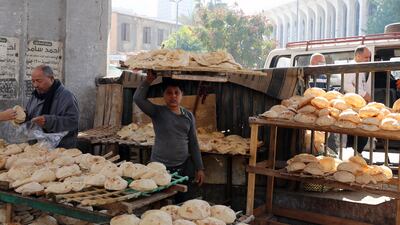Egypt is to withdraw from the UN’s Grains Trade Convention after more than a year in arrears over the International Grains Council’s membership fee.
For Egypt, that cost was GBP48,000 ($57,806) in the most recent fiscal year, said Arnaud Petit, executive director of the London-based council that administers the treaty, of which Egypt has been a member for nearly 30 years.
The fee is calculated as a percentage of the country’s share of global grains trade.
“We can understand that, for the time being, the [foreign currency crunch] has had a huge impact,” Mr Petit told The National. “The cost of the exchange rate has really been a double burden for importing countries.”
Egypt, one of the world’s largest wheat importers, has been deeply affected by the economic fallout of the Russia-Ukraine war.
The Egyptian pound has been devalued three times over the past year and has lost nearly 50 per cent of its value against the US dollar.
Inflation is up nearly 32 per cent year on year, primarily on soaring food prices.
Egypt signed the GTC at its inception in 1995 and has been a member of the governing council since 1949.
Last month, Egypt submitted an official request to withdraw with effect from June 30.
Egypt’s foreign ministry told Reuters that the decision was made after an assessment by the ministries of supply and trade concluded the membership delivered “no added value”.
Thirty-five grain exporters and importers are signatories to the convention, including the EU, UK, US, Russia and Ukraine.
The convention promotes market transparency and facilitates trade co-operation, but is not a regulatory body.
The council monitors the prices of 22 commodities, such as wheat, maize, soy beans and rice, on a daily basis and provides that information to members.
Although Egypt was in arrears, it still had access to this information and faced no financial penalties, Mr Petit said. Its vote was suspended on very limited decisions, such as the council's chairmanship.
Mr Petit urged Egypt to look beyond the “short-term problem” of its foreign currency shortage “because market transparency is really the only way to avoid speculation and volatility in the global market”.
Egypt’s strategic wheat and rice reserves are enough to last the coming 3.3 months, the country’s supply minister said on Tuesday.


